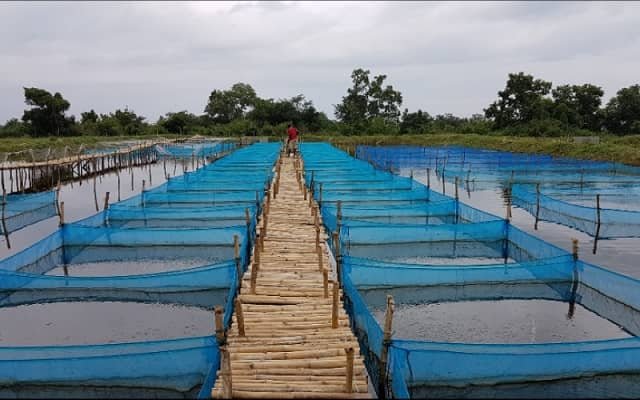by Lourdes Mederos, University of Florida Institute of Food and Agricultural Sciences (UF/IFAS)
Shellfish like clams and oysters can help restore ocean health and support economic development and food production in coastal communities worldwide.
A scientist at the University of Florida Institute of Food and Agricultural Sciences (UF/IFAS) has partnered with Florida Sea Grant researchers on a $100,000 grant awarded by The Nature Conservancy (TNC). Through the grant, scientists plan to quantify the ecosystem benefits of bivalve aquaculture, specifically assessing the use of oysters and clams. Researchers also will explore how to integrate shellfish into water quality policies in the state.
The Conservancy announced the grant recipients this month as part of the new Supporting Oyster Aquaculture and Restoration (SOAR) Shellfish Growers Resiliency Fund.
“The grant will help pave the way for shellfish aquaculture in Florida,” said Ashley Smyth, an assistant professor of biogeochemistry and soil and water sciences at UF/IFAS Tropical Research and Education Center in Homestead, Florida. “The amount of nitrogen removed by oyster and clam aquaculture in Florida is unknown. Until those data exist, it is difficult to have a direct path for shellfish growers to contribute to water quality restoration and mitigation policies, or to be compensated for the ecosystem services that their products provide.”
Smyth and a team of Florida Sea Grant agents will measure nitrogen removal by shellfish farmers, conduct a policy analysis and survey credit buyers and shellfish growers to determine costs of credits by:
– Conducting a survey of shellfish farmers around the state,
– Sampling water at four shellfish aquaculture farms — two oyster and two clam — along the Gulf Coast,
– Reviewing the current policies around payments for ecosystem services and nutrient trading credits.
Stay Always Informed
Join our communities to instantly receive the most important news, reports, and analysis from the aquaculture industry.
“This grant will give us local and statewide data related to the specific role that shellfish aquaculture plays in regulating nutrients,” said Smyth. “This is the information that is needed to accurately compensate shellfish growers for their ecosystem services.”
Oysters and clams are more than a fine dining center-of-the-plate. They are efficient water filterers and natural buffers for coastal communities. Farmed or wild, a healthy adult oyster can filter up to 50 gallons of water daily, removing excess nutrients in coastal waters, often caused by runoff.
Oyster reefs, which can be made of hundreds of thousands of oysters, help protect shorelines from erosion by serving as natural buffers against rising tides and hurricanes. Despite the benefits they provide, oyster reefs are the most imperiled marine habitat on Earth. Globally, over 85% of oyster reefs have disappeared due to overharvesting, diseases and habitat modification.
When the pandemic caused restaurants across the country to close unexpectedly, many oyster farmers couldn’t sell their product. SOAR was created to support struggling farmers by purchasing unsaleable live oysters to use on restoration sites. Since its launch in October of 2020, SOAR has supported 125 shellfish farming companies and sustained over 450 jobs across seven states.
UF/IFAS has joined the project to encourage diversity, equity and inclusion in the shellfish industry; diversify products and marketing streams; encourage grower participation in marine conservation efforts and enhance the sustainability of farming operations.
Joining Smyth on the UF/IFAS project is a team of Florida Sea Grant agents or FSG-affiliated faculty across the state. From Gainesville, these faculty include Shirley Baker, Kelly Grogan and Tom Ankerson. Helping with restoration aquaculture from the Tampa Bay Region are Angela Collins and Josh Patterson. Assisting along the rest of the Gulf Coast are Leslie Sturmer from Cedar Key, and Erik Lovestrand from Franklin County.
Editor at the digital magazine AquaHoy. He holds a degree in Aquaculture Biology from the National University of Santa (UNS) and a Master’s degree in Science and Innovation Management from the Polytechnic University of Valencia, with postgraduate diplomas in Business Innovation and Innovation Management. He possesses extensive experience in the aquaculture and fisheries sector, having led the Fisheries Innovation Unit of the National Program for Innovation in Fisheries and Aquaculture (PNIPA). He has served as a senior consultant in technology watch, an innovation project formulator and advisor, and a lecturer at UNS. He is a member of the Peruvian College of Biologists and was recognized by the World Aquaculture Society (WAS) in 2016 for his contribution to aquaculture.




